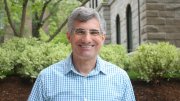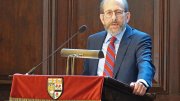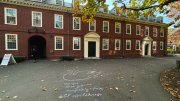On the morning of May 12, Katie Lapp, Harvard’s executive vice president since 2009, announced that she will be stepping down from her position at the end of the summer. Moving into her position will be Meredith Weenick ’90, M.B.A. ’02, the current vice president for campus services.
Lapp arrived at Harvard with a variety of past leadership experiences, including roles as executive director of the Metropolitan Transportation Authority and as executive vice president for business operations for the University of California. At Harvard, she acted as the University’s chief administration officer, overseeing the financial, administration, human resources, and capital planning functions of the central administration, as well as information technology. She was only the second person to assume the role, succeeding Ed Forst ’82, who helped the University respond to the Great Recession in a year of service beginning in 2008.
At Harvard, Lapp has led on a number of fronts—perhaps most notably the University’s development efforts in Allston, where she oversaw the creation of the science and engineering complex and planning for the developing enterprise research campus, among other initiatives in the area. Beginning in 2020, she worked closely with President Lawrence S. Bacow and Provost Alan Garber to manage the University’s response to the coronavirus pandemic, helping the University shift technologically to remote learning, implementing testing and tracing procedures, and planning a return-to-campus for students, faculty, and staff. She is also credited for overseeing the University’s sustainability efforts; in the decade leading up to 2016, she helped reduce campus greenhouse gas emissions by 30 percent. Noted Bacow in an email to the community: “There is not a part of Harvard untouched by her outstanding service.”
“I can honestly say that I have enjoyed every single day of my time at Harvard,” Lapp said in a statement. “I am grateful for the abundant support, collegiality, and friendship that I have experienced as a part of this team, and I will miss it.” While she so no immediate plans for a new role, she hopes to pursue future opportunities “that align with [her] career-long commitment to the public sector and non-profit institutions.”
Bacow noted that he did not have to “go far afield” to find Lapp’s successor, Weenick, who has worked alongside Lapp for several years across several projects. “For the past eight years, Meredith has done an extraordinary job managing an expanding portfolio of operations, including energy, facilities, and transportation,” he wrote. “She has built strong relationships within and beyond Harvard that will enable the work of the executive vice president’s office to continue apace, and I am thrilled that she has agreed to serve her alma mater in a new role.”
Weenick was appointed vice president for campus services in 2014 after more than 11 years of work for the City of Boston—including four years as the city’s chief financial officer. There, she oversaw capital and operating budgets, debt and investment strategy, financial auditing and reporting, and risk management. At Harvard, she has managed a wide variety of projects and played a role in the design, renovation, and operation of the Smith Campus Center. In 2016, she was appointed by former Harvard President Drew Faust as co-chair of the Task Force on Inclusion and Belonging.
A former Mather House resident and Business School graduate, Weenick described in her 25th Reunion Report her return to Harvard after more than a decade of public service. “That’s a long way to go for an English concentrator,” she noted in 2015, “though not when measured in miles.”









